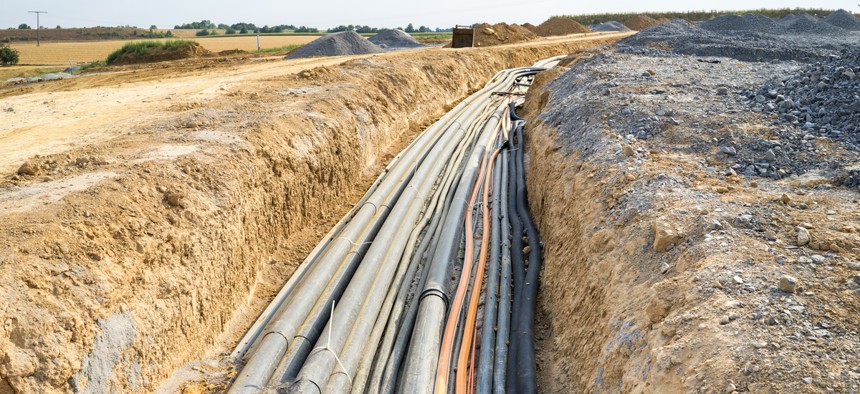Here Are Some of the ‘Promising Practices’ in State Broadband Expansion

Shutterstock / ThomBal

Connecting state and local government leaders
A new Pew Charitable Trusts report found that policies like “dig once” requirements can encourage better collaboration with internet service providers to expand access.
States are helping bring broadband internet to rural areas by enacting a range of policies that identify barriers to expansion and reduce bureaucracy that can hamper build outs, a new Pew Charitable Trusts report has found.
For instance, the report highlights California’s and West Virginia’s implementation of “dig once” policies, which can encourage collaboration with utility and transportation infrastructure projects and help overcome barriers to connectivity. Eleven states have adopted dig once policies, which can require the consultation or inclusion of broadband infrastructure during road construction, according to Broadband Now. These policies can reduce costs to communities by eliminating the need to dig up roads at a later time to expand broadband access.
California adopted a dig once policy in 2016 that requires the state Department of Transportation to notify internet service providers of planned roadwork projects.
“Its aim was to streamline the process for these providers to deploy infrastructure along state highways by identifying opportunities to bury fiber-optic cables in ground that has already been opened for roadwork,” the Pew report states.
West Virginia adopted a similar policy in 2018 that allows the Division of Highways to lease access to rights of way to internet service providers. It also establishes a process to notify utilities, including broadband providers, of upcoming roadwork projects.
In the Pew report, researchers reviewed policies and measures that nine states are taking to expand broadband access in rural areas. The report acknowledges that each state has different resources, may work with different service providers, and are likely in different stages of expanding broadband access. But, overall, it highlights five common “promising practices” that researchers found among the states. Those practices include engaging stakeholders, creating a policy framework, planning and capacity building, providing funding and operations support, and evaluating programs as they evolve.
Other examples of ways that states can address barriers to connectivity through legislation include Tennessee’s decision to allow electric cooperatives to provide internet service. Further, Colorado now allows utility companies to use existing easements on private land for commercial broadband service so long as property owners are notified, the report states.
In its review of state policies, the Pew report also identified the establishment of specific broadband speed definitions and goals as helpful in guiding expansion.
“These measures, often set in statute, create a framework for broadband expansion efforts, providing clarity to providers and communities as they make decisions about investing in broadband infrastructure,” the report states.
The report highlights Minnesota as an example for adopting legislation that establishes the state’s goal to connect all homes and businesses to download speeds of 100 megabits per second and upload speeds of 20 mbps by 2026. The state legislature later created the Office of Broadband Development “to facilitate broadband expansion and help the state make progress toward these goals,” the report states.
“While no silver bullet will ensure better broadband connectivity, officials at all levels of government can gain insights from these examples on how to bring this critical service to areas that remain unserved,” the report states.
While the Federal Communications Commission has pledged $20 billion to subsidize the construction of high-speed broadband networks in rural America over the next 10 years, concern about the accuracy of the FCC’s broadband access maps has led states to step up their own efforts.
The Pew report emphasizes that while much of the broadband conversation revolves around federal expansion efforts, “states play a critical role in deploying broadband, and their efforts are making a significant difference in expanding access.”
Andrea Noble is a staff correspondent for Route Fifty.

NEXT STORY: The Human Cost of Missing Data in Prisons




